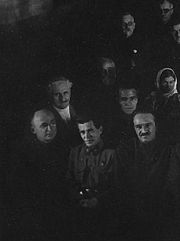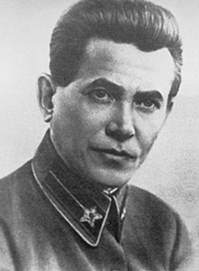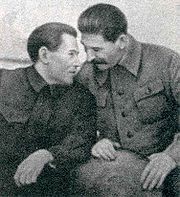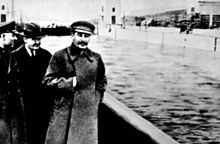- Nikolai Yezhov
-
Nikolai Yezhov
Russian: Николай Иванович ЕжовPeople's Commissar for State Security In office
January 27, 1937 – November 25, 1938People's Commissar for Internal Affairs (NKVD) In office
September 26, 1936 – January 27, 1937Preceded by Genrikh Yagoda Succeeded by Lavrentiy Beria Personal details Born May 1, 1895
St. Petersburg, RussiaDied February 4, 1940 (aged 44)
Moscow, Russian SFSR, Soviet UnionPolitical party Communist Party of the Soviet Union Spouse(s) Antonia Titova (1919-1930),
Yevgenia Feigenberg (1930-1938)Children (to Yevgenia) Natasha Yezhova Nickname(s) Russian: Ежевика (Blackberry)[1]
Iron Hedgehog[2]Nikolai Ivanovich Yezhov or Ezhov (Russian: Никола́й Иванович Ежо́в) (IPA: [nʲɪkɐˈlaj jɪˈʐof]; May 1, 1895 – February 4, 1940) was a senior figure in the NKVD (the Soviet secret police) under Joseph Stalin during the period of the Great Purge. His reign is sometimes known as the "Yezhovshchina" (Russian: Ежовщина), "the Yezhov era", a term that began to be used during the de-Stalinization campaign of the 1950s.[3]
Contents
Early life and career
Yezhov was born in Saint Petersburg, according to his official Soviet biography, though other records[specify] point to the possibility that he was born in Marijampolė. In a form filled out in 1921, Yezhov claimed some ability to speak Polish and Lithuanian.
He completed only his elementary education. From 1909 to 1915, he worked as a tailor's assistant and factory worker. From 1915 until 1917, Yezhov served in the Imperial Russian Army. He joined the Bolsheviks on May 5, 1917 in Vitebsk, seven months before the October Revolution. During the Russian Civil War, 1919–1921, he fought in the Red Army. After February 1922, he worked in the political system, mostly as a secretary of various regional committees of the Communist Party. In 1927, he was transferred to the Accounting and Distribution Department of the Communist Party where he worked as an instructor and acting head of the department. From 1929 to 1930, he was the Deputy People's Commissar for Agriculture. In November 1930, he was appointed to the Head of several departments of the Communist Party: department of special affairs, department of personnel and department of industry. In 1934, he was elected to the Central Committee of the Communist Party;[4] in the next year he became a secretary of the Central Committee. From February 1935 to March 1939, he was also the Chairman of the Central Commission for Party Control.
In the "Letter of an Old Bolshevik" (1936), which is purported to be the musings of Nikolai Bukharin[citation needed], there is this contemporary description of Yezhov:
In the whole of my long life, I have never met a more repellent personality than Yezhov's. When I look at him I am reminded irresistibly of the wicked urchins of the courts in Rasterayeva Street, whose favorite occupation was to tie a piece of paper dipped in paraffin to a cat's tail, set fire to it, and then watch with delight how the terrified animal would tear down the street, trying desperately but in vain to escape the approaching flames. I do not doubt that in his childhood Yezhov amused himself in just such a manner and that he is now continuing to do so in different forms.Nadezhda Mandelstam, in contrast, who met Yezhov at Sukhum in the early thirties, did not perceive anything ominous in his manner or appearance; her impression of him was that of a 'modest and rather agreeable person.'.[5] Physically, Yezhov was short in stature, standing five feet, or 151 cm - and that, combined with his sadistic personality, led to his nickname 'The Poisonous Dwarf' or 'The Bloody Dwarf'.
Personal life
Yezhov had married the educated and sincerely Marxist Antonia Titova in 1919, but he later divorced her and married Yevgenia Feigenburg. Yezhov and Feigenburg had an adopted daughter, Natasha, an orphan from a children's home.
Head of the NKVD
Yezhov was known as a devout Bolshevik and loyalist of Joseph Stalin, and in 1935 he wrote a paper on Stalinism in which he argued that since political unorthodoxy was impossible in a perfect Communist state (such as the USSR), any form of political opposition to Stalinist policies was actually evidence of conspiracy by "disloyal elements" to overthrow the Soviet state, thus requiring violence and state terrorism to "root out" these "enemies of the People"; this became in part the ideological basis of the purges.[6] He became People's Commissar for Internal Affairs (head of the NKVD) and a member of the Central Committee on September 26, 1936, following the dismissal of Genrikh Yagoda. This appointment did not at first seem to suggest an intensification of the terror: "Unlike Iagoda, Ezhov did not come out of the 'organs,' which was considered an advantage."[7] Yezhov's first task from Stalin was to personally investigate and conduct the prosecution of his long-time Chekist mentor Yagoda, which he did with remorseless zeal. Ordered by Stalin to create a suitably grandiose plot for Yagoda's show trial, Yezhov ordered the NKVD to sprinkle mercury on the curtains of his office so that the physical evidence could be collected and used to support the charge that Yagoda was a German spy, sent to assassinate Yezhov and Stalin with poison and restore capitalism.[8] He also personally tortured both Yagoda and Marshal Mikhail Tukhachevsky to extract their confessions.[9] As a final insult for his former mentor, Yezhov ordered Yagoda to be stripped naked and severely beaten by the guards at the Lubyanka before being dragged into the execution chamber and shot.
Yagoda was but the first of many to die by Yezhov's orders. Under Yezhov, the Great Purge reached its height during 1937-1938, with between 50-75% of the members of the Supreme Soviet and officers of the Soviet military being stripped of their positions and imprisoned, exiled to the Siberian gulags or executed, along with a greater number of ordinary Soviet citizens, accused (usually on flimsy or nonexistent evidence) of disloyalty or "wrecking" by local Chekist troikas in order to satisfy Stalin and Yezhov's arbitrary quotas for arrests and executions. Yezhov also conducted a thorough purge of the security organs, both NKVD and GRU, removing and executing many officials who had been appointed by his predecessors Yagoda and Menzhinsky, but even his own appointees as well. He admitted that innocents were being falsely accused, but dismissed their lives as unimportant so long as the purge was successful:
There will be some innocent victims in this fight against Fascist agents. We are launching a major attack on the Enemy; let there be no resentment if we bump someone with an elbow. Better that ten innocent people should suffer than one spy get away. When you chop wood, chips fly. [10]In 1937 and 1938 alone at least 1.3 million were arrested and 681,692 were shot for 'crimes against the state'. The Gulag population swelled by 685,201 under Yezhov, nearly tripling in size in just two years, with at least 140,000 of these prisoners (and likely many more) dying of malnutrition, exhaustion and the elements in the camps (or during transport to them).[11]
The apex of Yezhov's career was reached on 20 December 1937, when the party hosted a giant gala to celebrate the 20th anniversary of the NKVD at the Bolshoi Theater. Enormous banners with portraits of Stalin hung side-by-side with those of Yezhov. On a stage crowded with flowers, Anastas Mikoyan, dressed in a dark caucasian tunic and belt, praised Yezhov for his tireless work. "Learn the Stalin way to work", he said, "from Comrade Yezhov, just as he learned and will continue to learn from Comrade Stalin himself". When presented, Yezhov received an "uproarious greeting" of thunderous applause. He stood, one observer wrote, "eyes cast down and a sheepish grin on his face, as if he wasn't sure he deserved such a rapturous reception." Yezhov may well have also realized the danger he was in from such a lavish display of independent public praise; Stalin was always deeply suspicious of the public popularity and political ambitions of his immediate subordinates, and he was present at the event, observing the scene "silently and without expression" from his private box.
Fall from power
Yezhov was appointed to the post of People's Commissar for Water Transport on April 6, 1938. Though he retained his other posts, his role as grand inquisitor and extractor of confessions gradually diminished as Stalin retreated from the worst excesses of the Great Purge.
By charging him with the extra job, Stalin killed two birds with one stone: Yezhov could correct the water transportation situation with tough Chekist methods, and his transfer to the terra incognita of economic tasks would leave him less time for the NKVD and weaken his position there, thus creating the possibility that in due course he could be removed from the leadership of the punitive apparatus and replaced by fresh people.[12]
Contrary to Stalin's expectations, the vast number of party officials and military officers lost during Yezhov's purges had been only partially made good by replacement with trusted Stalinist functionaries, and he eventually correctly recognized that the disruption was severely affecting the country's ability to coordinate industrial production and defend its borders from the growing threat of Nazi Germany. Yezhov had accomplished Stalin's intended task for the Great Purge: the public liquidation of the last of his Old Bolshevik political rivals and the elimination of any possibility of "disloyal elements" or "fifth columnists" within the Soviet military and government prior to the onset of war with Germany. From Stalin's perspective, Yezhov (like Yagoda) had served his purpose but had seen too much and wielded too much power for Stalin to allow him to live.[citation needed] The defection of the Far Eastern NKVD chief, G.S. Liushkov to Japan on June 13, 1938, rightly worried Yezhov, who had protected him from the purges and feared he would be blamed.[13]
Arrest and death
 Lavrenty Beria, Nikolai Yezhov and Anastas Mikoyan (front row - left to right) at a reception of delegates from different parts of the USSR, September 1938.
Lavrenty Beria, Nikolai Yezhov and Anastas Mikoyan (front row - left to right) at a reception of delegates from different parts of the USSR, September 1938.
On August 22, 1938 Georgian NKVD leader Lavrenty Beria was named as Yezhov's deputy. Over the following months, Beria (with Stalin's approval) began increasingly to usurp Yezhov's governance of the Commissariat for Internal Affairs. As early as September 8, Mikhail Frinovsky, Yezhov's first deputy, was relocated from under his command into the Navy. Stalin's penchant for periodically executing and replacing his primary lieutenants was well known to Yezhov, as he had previously been the man most directly responsible for orchestrating such actions.
Well acquainted with the typical Stalinist bureaucratic precursors to eventual dismissal and arrest, Yezhov recognized Beria's increasing influence with Stalin as a sign his downfall was imminent, and plunged headlong into alcoholism and despair. Already a heavy drinker, in the last weeks of his service he reportedly was disconsolate, slovenly, and drunk nearly all of his waking hours, rarely bothering to show up to work. As anticipated, Stalin and Vyacheslav Molotov, in a report dated November 11, sharply criticized the work and methods of the NKVD during Yezhov's tenure as chief, thus creating the bureaucratic pretense necessary to remove him from power.
On November 14, another of Yezhov’s protegés, the Ukrainian NKVD chief A.I. Uspensky, disappeared after having been warned by Yezhov that he was in trouble; Stalin suspected that Yezhov was involved in the disappearance, and told Beria, not Yezhov, that Uspenskii must be caught (he was arrested on April 14, 1939).[14] On November 19, his wife Evgenia committed suicide by taking an overdose of sleeping pills; she was particularly vulnerable because of her many lovers, and people close to her had been being arrested for months (Yezhov had told her on September 18 that he wanted a divorce, and she had begun writing increasingly despairing letters to Stalin, none of which were answered).[15]
At his own request, Yezhov was officially relieved of his post as the People's Commissar for Internal Affairs on November 25, succeeded by Beria, who had been in complete control of the NKVD since the departure of Yezhov’s deputy Frinovskii on 8 September (Frinovskii was appointed People’s Commissar of the Navy).[16] He attended his last Politburo meeting on January 29, 1939.
Stalin was evidently content to ignore Yezhov for several months, finally ordering Beria to denounce him at the annual Presidium of the Supreme Soviet. On March 3, 1939 Yezhov was relieved of all his posts in the Central Committee of the Communist Party of the Soviet Union, but retained his post as People’s Commissar of Water Transportation (his last working day was April 9, at which time the "People’s Commissariat was simply abolished by splitting it into two, the People’s Commissariats of the River Fleet and the Sea Fleet, with two new People’s Commissars, Z.A. Shashkov and S.S. Dukel’skii"[17]).
Arrest
On April 10, he was arrested and imprisoned at the Sukhanovka prison; the "arrest was painstakingly concealed, not only from the general public but also from most NKVD officers... It would not do to make a fuss about the arrest of 'the leader’s favorite,' and Stalin had no desire to arouse public interest in NKVD activity and the circumstances of the conduct of the Great Terror."[18] Amongst his main accusations the former Narkom was accused in accordance with Article 154 of the Soviet Criminal Code ("sodomy, committed with violence or the use of the dependent status of the victim").[19][20][21]
Yezhov supposedly broke quickly under torture, and confessed to the standard litany of state crimes necessary to firmly establish a Soviet political prisoner's status as an "enemy of the people" prior to execution, including "wrecking", official incompetence, theft of government funds and treasonous collaboration with German spies and saboteurs, none of which were likely or supported by evidence. Apart from these unlikely political crimes, he also confessed to a humiliating history of sexual deviancy, both homosexual and heterosexual, that was (unusually, in contrast with other condemned Bolshevik officials) later corroborated by witness reports and deemed mostly true in post-Soviet examinations of the case.[22]
Among the many people dragged down in Yezhov's fall was Isaak Babel: "In May 1939 Ezhov confessed that Babel’ had committed espionage together with [Yezhov's wife] Evgeniia. Within a week the writer was arrested; during interrogation he in his turn testified against the Ezhovs."[23] However, Yezhov's first wife, Antonina Titova, his sister, Evdokiia, and his mother all survived.[24]
Trial
On February 2, 1940, Soviet judge Vasili Ulrikh tried Yezhov in Beria's office.[25] Yezhov was nearly incoherent, and, like his predecessor Yagoda, mournfully maintained to the end his love for Stalin. Apparently still hoping for a show trial, Beria suggested once again that Yezhov confess to a plot to kill Stalin but was flatly refused, with Yezhov maintaining that "it is better to leave this earth as an honorable man."
Yezhov begged Beria on his knees for a few minutes with Stalin to explain himself, and was repeatedly ignored, finally vowing he would "die with Stalin's name on his lips". When the sentence of death was read, Yezhov fainted and had to be carried from the room.
Execution
Just before the execution, Yezhov was ordered to undress himself and then was brutally beaten by guards at the order of Beria, the new NKVD Chief, just as Yezhov had ordered the guards to beat and humiliate his predecessor Yagoda before his execution only two years prior. Yezhov had to be carried into the execution chamber semi-conscious, hiccupping and weeping uncontrollably.
On February 4, he was executed by the Chief Executioner and Commandant of Lubyanka, NKVD Major-General Vasili Blokhin, probably in the basement of a small NKVD station on Varsonofevskii Lane in Moscow. The main NKVD execution chamber in the basement of the Lubyanka was deliberately avoided to ensure total secrecy.
His body was immediately cremated and his ashes dumped in a common grave at Moscow's Donskoi Cemetery.[26] The execution remained secret, and as late as 1948, Time reported that “[s]ome think he is still in an insane asylum.″[27]
Yezhov's refusal to admit to a conspiracy against Stalin's life and his long, verifiable history as Stalin's primary inquisitor during the Great Purge made him too dangerous to risk at a public show trial where he might betray Stalin's secrets or successfully expose Stalin's orchestration of the Purge.[28]
In addition, the scapegoating of Yezhov allowed Stalin to end the Great Purge while still retaining plausible deniability of his direction over it. This was further reinforced by Stalin's decision to declare damnatio memoriae on Yezhov, a fate normally reserved for only the highest-ranking and most prominent of Stalin's political enemies, and all evidence of his existence was quietly censored from State records and publications.
Though his daughter Natalia Khayutina has fought for a revision of the case, Yezhov has not been rehabilitated (the Procuracy decided that because of the serious consequences of Yezhov’s activity as NKVD chief and the casualties he inflicted upon the country, he was not subject to rehabilitation, and the Military Collegium of the Supreme Court concurred on June 4, 1998).[29]
Popular culture
- The following "paean of praise" by the Kazakh people's poet Jambyl Jabayev was translated by K. Altaysky and published in Pionerskaya Pravda (Pioneer's Truth, #171) on December 20, 1937:
-
Narkom Yezhov
The million-voiced sonorous word
flies from the peoples to batyr Yezhov:
"Thanks, Yezhov, for raising the alarm,
You stand on the guard for the country and its leader!" ..
...
Here, everybody loves you, Comrade Yezhov!
And the people repeat, gathering around:
"Greetings to you, Stalin's faithful friend!" ...Нарком Ежов
Мильонноголосое звонкое слово
Летит от народов к батыру Ежову:
- Спасибо, Ежов, что, тревогу будя,
Стоишь ты на страже страны и вождя!..
...
Здесь все тебя любят, товарищ Ежов!
И вторит народ, собираясь вокруг:
- Привет тебе, Сталина преданный друг!...
- Anna Akhmatova's poem "Requiem" begins with this line "instead of a preface": "In the terrible years of the Yezhovshchina, I spent seventeen months waiting in line at prison in Leningrad".
Honours and awards
- This article incorporates information from the equivalent article on the Russian Wikipedia.
- Order of Lenin
- Order of the Red Banner (Mongolia)
- Badge of "Honorary security officer"
A decree of the Presidium of the Supreme Soviet on 24 January, 1941 deprived Yezhov of all state and special awards.
See also
References
- ^ Montefiore, The Poison Dwarf Stalin: The Court of the Red Tsar, chapter 21.
- ^ Service (2009), chapter 11.
- ^ Marc Jansen and Nikita Petrov, Stalin's Loyal Executioner: People's Commissar Nikolai Ezhov, 1895-1940 (Hoover Institution Press, 2002: ISBN 0817929029), p. 210.
- ^ Nikolai Ivanovich Yezhov: Biographical Notes
- ^ N. Mandelstam, Hope Against Hope (Collins & Harvill Press, 1971), page 322.
- ^ Lucas, Dean (2007-09-03). "Famous Pictures Magazine - Altered Images". pub. http://www.famouspictures.org/mag/index.php?title=Altered_Images#Trotsky.3F_What_Trotsky.3F. Retrieved 2007-10-13.
- ^ Jansen and Petrov, Stalin's Loyal Executioner, p. 56.
- ^ Sebag-Montefiore, 219.
- ^ Sebag-Montefiore, 222.
- ^ Sebag-Montefiore, 218.
- ^ Orlando Figes The Whisperers: Private Life in Stalin's Russia, 2007, ISBN 0-08050-7461-9, page 234.
- ^ Jansen and Petrov, Stalin's Loyal Executioner, p. 140.
- ^ Jansen and Petrov, Stalin's Loyal Executioner, pp. 143-44.
- ^ Jansen and Petrov, Stalin's Loyal Executioner, pp. 166-70.
- ^ Jansen and Petrov, Stalin's Loyal Executioner, pp. 163-66.
- ^ Jansen and Petrov, Stalin's Loyal Executioner, pp. 151-52.
- ^ Jansen and Petrov, Stalin's Loyal Executioner, p. 181.
- ^ Jansen and Petrov, Stalin's Loyal Executioner, p. 182.
- ^ Jansen and Petrov, Stalin's Loyal Executioner, p. 183.
- ^ Literaturnaya Gazeta #7, 1992.
- ^ Kudrinskikh, A. Nikolai Yezhov: Bloody dwarf. Moscow, 2006.
- ^ Sebag-Montefiore, 275.
- ^ Jansen and Petrov, Stalin's Loyal Executioner, p. 185.
- ^ Jansen and Petrov, Stalin's Loyal Executioner, p. 191.
- ^ Jansen and Petrov, Stalin's Loyal Executioner, p. 187.
- ^ Montefiore, 288
- ^ "COMMUNISTS: The Hunter". Time. March 22, 1948. http://www.time.com/time/magazine/article/0,9171,804478-4,00.html. Retrieved May 20, 2010.
- ^ Sebag-Montefiore, 203.
- ^ Jansen and Petrov, Stalin's Loyal Executioner, p. 190.
Further reading
- Boris I. Nicolaevsky (1975). Power and the Soviet elite: "The letter of an old Bolshevik," and other essays. Ann Arbor, Mich: University of Michigan Press. ISBN 0-472-09196-4.
- Roi Aleksandrovich Medvedev (Author), Harold Shukman (Author) (August 7, 1985). All Stalin's Men. Blackwell Publishers. ISBN 0631141871.
- Simon Sebag Montefiore (September 13, 2005). Stalin: The Court of the Red Tsar. Vintage. ISBN 1400076781.
- Nikita Petrov, Marc Jansen (April 5, 2002). Stalin's Loyal Executioner: People's Commissar Nikolai Ezhov, 1895-1940 TLE. Hoover Institution Press. ISBN 0817929029.
External links
- Nikita Petrov, Marc Jansen: Stalin's Loyal Executioner: People's Commissar Nikolai Ezhov, 1895-1940 (full text in PDF)
- Interrogations of Nikolai Ezhov, former People's Commissar for Internal Affairs
Categories:- 1895 births
- 1940 deaths
- People from Saint Petersburg
- Soviet politicians
- NKVD officers
- Directors of intelligence agencies
- People executed by firing squad
- Great Purge victims
- LGBT people from Russia
- Executed Soviet people
- Executed Russian people
- People executed by the Soviet Union
- Unpersons in the Eastern Bloc
- Great Purge perpetrators
- Politburo of the Central Committee of the Communist Party of the Soviet Union candidate members
- Recipients of the Order of Lenin
Wikimedia Foundation. 2010.




